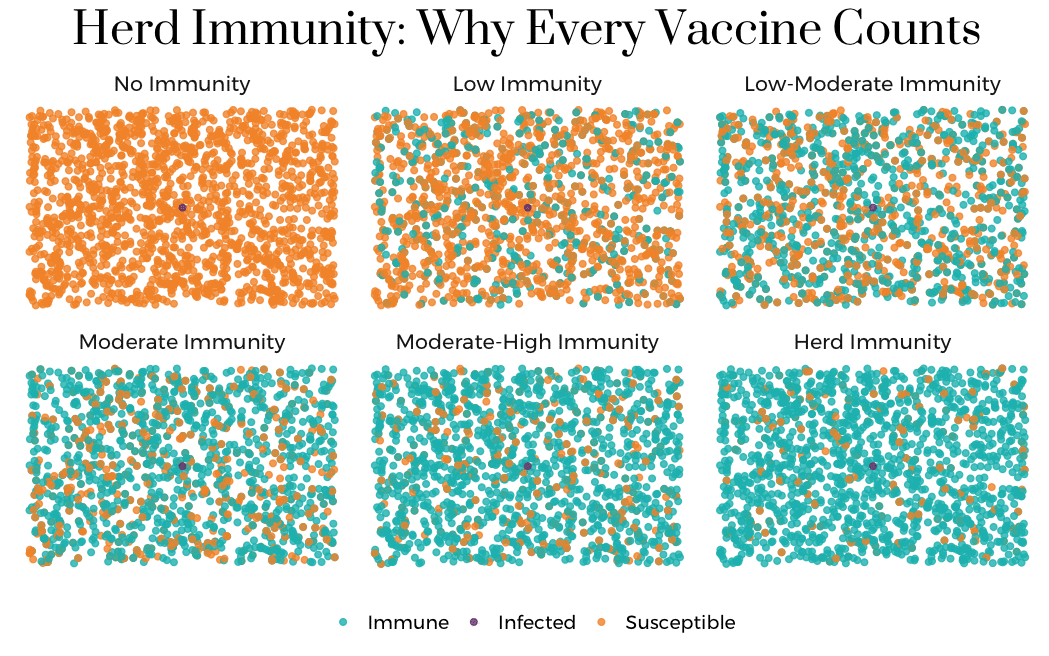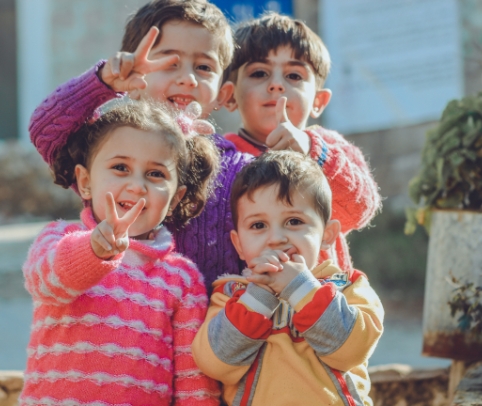- About Vaccines
- Answering Your Questions
Search by Category
- Resources

Resources
Here are some of the tools and information we recommend using based on real medical science and research.
- News
- Contact
PROTECTING OUR COMMUNITIES
Your decision has a big impact on your community.
As a parent, you want to make the right choices for your child to best protect them.
But vaccination is not just a personal choice. Your decision affects the health of all children in your community, including your own. The vaccinated community helps to protect those who are not vaccinated, a concept known as “herd immunity” or “community immunity.” When 90–95 percent of a community is protected, it is nearly impossible for a vaccine-preventable disease to spread.

Source: GIF created by Edmund Helmer, Data Scientistbased on research from Epidemiologic Reviewscited by PBS
Community immunity is an umbrella of protection.
Think of germs as rain, and hand washing as a raincoat.
Vaccination is an umbrella. If you put on a raincoat, you’re protecting just yourself. But if you use an umbrella, you can protect both yourself and those around you. The umbrella is “community immunity.” Those who don’t vaccinate rely on others to share their umbrella when it rains. But we need our communities to invest in umbrellas together. Newborns rely on their parents and on their caregivers to offer protection by sharing their umbrellas.

Vaccination protects the people you care about.
There are two critical points for vaccination to create community immunity:
- You need to be vaccinated.
- The people around you need to be vaccinated.
When a person is vaccinated, they prevent disease from spreading to others in the community, including:
- Babies who are too young to receive vaccines
- Pregnant women
- The elderly
- Individuals who cannot be vaccinated for medical reasons, such as those with weakened immune systems, asthma, chronic illness, or undergoing treatment for cancer
For most vaccine-preventable diseases, when less than 90 percent of children are vaccinated in a particular community, these pockets of low vaccination create an environment where diseases can take hold and spread.

Only a very small percentage of children in the U.S. are completely unvaccinated—about 3 percent—however, they tend to group in certain communities.
Parents may share false information they find online, or talk to a friend who has decided not to vaccinate their child. This misinformation can spread throughout a community and put community immunity in jeopardy. According to Michigan Care Improvement Registry (MCIR) data from June 2019, only 59.1 percent of Michigan toddlers are up to date on all of their recommended vaccinations.
The percent of Michigan children ages 19 through 35 months who are protected against the following diseases are shown below.
| BIRTH DOSE HEPATITIS B: 79.6% |
| COMBINED 7-VACCINE SERIES (4 DTAP, 3 POLIO, 1 MMR, 3 HIB, 3 HEPB, 1 VARICELLA, 4 PCV): 65.8% |
| COMBINED 8-VACCINE SERIES (4 DTAP, 3 POLIO, 1 MMR, 3 HIB, 3 HEPB, 1 VARICELLA, 4 PCV, 2 HEPA): 52.8% |
| 2+ HEP A: 54.8% |
| 4+ DTAP: 68.9% |
| COMPLETE FOR PCV: 74.5% UP-TO-DATE ROTAVIRUS (8-24 MONTHS): 63.7% |
Vaccine Abbreviations
| VACCINATIONS | DISEASES |
|---|---|
| DTaP | Diphtheria, Tetanus, Pertussis (Whooping Cough |
| Hep A | Hepatitis A |
| Hepatitis A | Hepatitis B |
| Hib | Haemophilus influenzae type b |
| HPV | Human Papillomavirus |
| IPV | Inactivated Poliovirus Vaccine |
| MMR | Measles, Mumps, Rubella |
| PCV | Pneumococcal Conjugate Vaccine |
| Rota | Rotavirus |
| Var | Varicella (Chickenpox) |
While progress has been made, there’s still room for improvement in Michigan communities. In recent years, Michigan had some of the lowest vaccination rates in the country.
Efforts have been made to improve vaccination coverage and as a result, more people are getting vaccinated. To continue to protect as many people as possible, more can still be done to achieve community immunity across our state.
Young children less than 3 years old:
Only 59.1 percent of Michigan toddlers aged 19 through 35 months are up to date on their vaccinations, according to data from MCIR from June 2019.
In Michigan, 69.9 percent of 5-month-old children were up to date for the recommended vaccines, but this number drops to 57.7 percent for 7-month-old children, according to MCIR data from August 2019
School-aged children:
During the 2017-18 school year, Michigan had the 8th highest non-medical exemption rate for kindergartners of the 45 states reporting in the nation, with 4.0% percent of parents simply choosing not to immunize their children.
In 2018, Michigan had 28 counties with a vaccine waiver rate of 5 percent or more among kindergartners.
Only 40.5 percent of Michigan teens aged 13 to 17 years are up to date on their vaccinations, according to data from MCIR from June 2019.

In many states including Michigan, vaccination rates of younger children dropped during the COVID-19 pandemic as parents postponed well-child visits to protect their kids from COVID-19.
As a result, vaccination rates for Michigan children ages 19 to 36 months have fallen below 70% in more than half of the state (42 of 83 Michigan counties), according to February 2021 data from the Michigan Care Improvement Registry (MCIR). In six Michigan counties and the City of Detroit, the rate has dropped below 60%. In Michigan, parents with school-age children have the option to sign a vaccination waiver for philosophical or religious reasons.
Parents who want a waiver for their child must attend an information session at their local health department. Areas with more vaccination waivers mean fewer children in the community are vaccinated and the community may not be protected by community immunity.